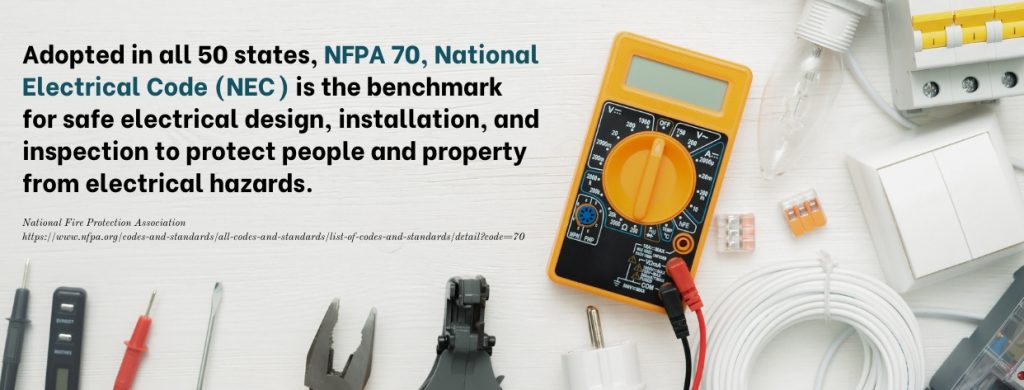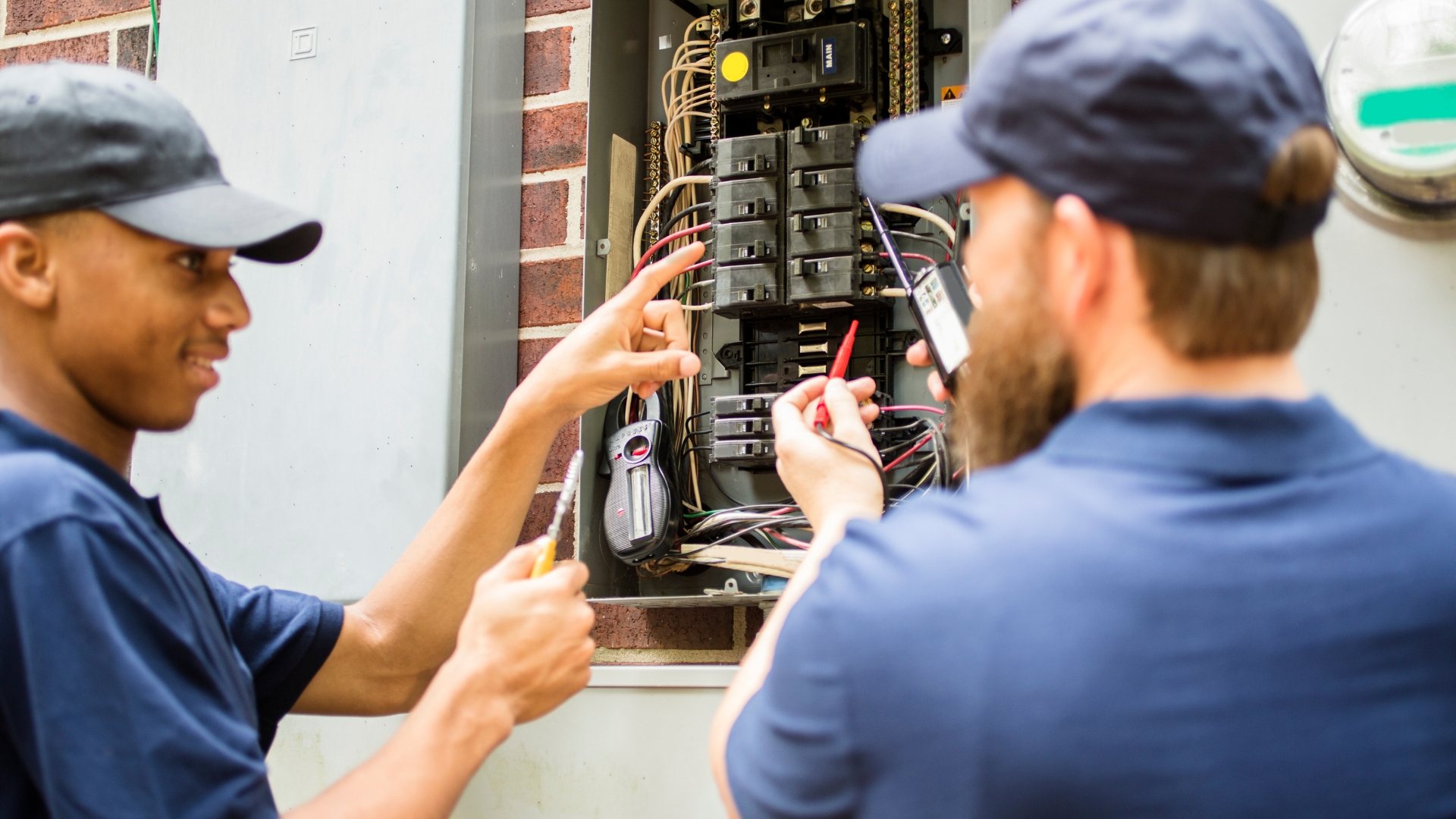Electricians are constantly in demand because they are very helpful in repairing, maintaining, and installing electrical boxes and power systems. Private houses and businesses both require this kind of work, which is why a career path as an electrician is one with very good job security.
What is an Electrician?
An electrician installs and maintains the power and electrical systems, lighting, communications, and control systems in new and existing structures. Electricians deal with the complex wiring, circuit breakers, switches, outlets, to keep houses, business establishments, and large factories running smoothly.
Electricians use different industry-specific tools in doing their tasks, including voltmeters, ammeters, cable testers, and thermal scanners. Some of their duties and responsibilities include:
- Understand and use technical diagrams and blueprints.
- Inspect transformers, circuit breakers, and other electrical components.
- Use testing devices in identifying and reporting electrical problems.
- Adhere to local and state building regulations.
- Complete non-residential installation, residential electrical system projects on time.
- Make records of materials used.
- Ensure that computer systems run smoothly by checking their cables, computer jacks, plugs, and many more.
Electrical technicians usually work for maintenance services, electrical companies, or contractors in carrying out various tasks. They closely work with other maintenance workers and electricians in installing and repairing electrical systems. Their task is to install outlets, circuit boards, provide cable and conduit service, and other electrical equipment. They may also troubleshoot electrical problems or perform repairs accordingly.
Electricians also make an inventory of supplies and tools and place orders for future projects.
The Labor Statistics discloses that electricians typically earn $28.96 per hour or $60,240 per year. Electrician employment is said to grow 6% between 2022 and 2033. This translates to 73,500 demand for electrical workers every year, on average, over the decade.
While most electricians learn through apprenticeships, others start out by enrolling in technical schools.
Methodology
This is a random list of 5 of the best online electrician trade schools. All schools in this list feature rigorous coursework and other unique features that help students excel in the field. These features include:
- 100% online or hybrid format,
- Programs are focused on the foundations of electrical systems like residential electrical wiring systems and other relevant online electrician courses,
- The coursework will prepare students to be knowledgeable in the national electrical code, residential electrical wiring systems, greenhouse wiring techniques, and general electrician careers,
- Encourages students to gain a master electrician’s license or pursue a bachelor’s degree in electrical engineering,
- Obtained proper accreditation.
5 Best Online Electrician Trade Schools
Penn Foster College

- Location: Scottsdale, Arizona
- Online Delivery Method: Online
- Time it takes to complete: 13 months (average); 9 months (fast track)
- Completion Rate: Undisclosed
- Types of Aid: None
Penn Foster offers an online Residential Electrician Career Diploma with electrician courses broken down into short, mobile-friendly, and interactive lessons to help students gain the skills they need for entry-level positions in the field.
This nationally accredited online program can prepare students to work as electricians with contractors, construction companies, and manufacturing companies. Some of the core courses include:
- Electrical Safety and Tools
- Basic Electrical Theory
- Electrical Fundamentals
- Reading Electrical Drawings and Schematics
- The National Electric Code
- Snap-on Tool Discount for Trades Students
One feature this online electrician school offers that you cannot find somewhere else is the individual courses offered based on every state’s requirements.
Upon signing up, students will have ten core courses that will teach them the relevant knowledge and skills involved in the career path of a residential electrician. They will also be assessed on how they will use these skills in various settings, like government work, residential, manufacturing, and commercial properties.
The courses in this residential electrician program consist of study sheets, sets of lectures, and quizzes. Because of these materials generally not that long, students can easily plot out their preferred study schedule according to their schedule.
Penn Forster has lots of materials for all its online courses, including the residential electrician career diploma program, such as:
- Mobile Friendly Platform
- Progress Tracking
- Video Lectures
- Interactive Flashcards
- Video Lectures
- Committed Support System
- Student Discussion Board
Ashworth College

- Location: Peachtree Corners: Georgie
- Online Delivery Method: Online, Self-Paced
- Time it takes to complete: 9 months
- Completion Rate: Undisclosed
- Types of Aid: Special Savings for Families
Ashworth College offers online Electrician training courses that are aligned with the National Electrical Code (NEC) to help students develop proper and safe electrician training and skills employers demand.
Future residential electricians will learn about electrical equipment installation and tool usage, basic AC and electricity current theory, plus topics on how to install electrical systems, photovoltaic system installation, installing electrical boxes, cable and conduit service for residential, commercial, construction, and trade jobs.
In this electrician training program, students will gain the skills for a successful career in electrical construction. This trade school has nine self-paced interactive courses and lessons that cover the most crucial information needed to become a residential electrician. Courses include:
- Working with Residential and Small Commercial Properties Electrical Systems
- Conduit Service, Cables, and Conductors
- Electrical Plans, Drawings, and Schematics
- Electrical Fundamentals
All these lessons are split up into 13 different parts based on the various aspects of the job. Every lesson has a set of chapters in a textbook, plus a series of lectures.
Ashworth College makes sure every licensed electrician they produce is provided with a job search prep program. This way, students can easily use their skills in a professional setting as soon as they complete their electrical technology program.
Volunteer State Community College

- Location: Gallatin, Tennessee
- Online Delivery Method: Online; self-paced
- Time it takes to complete: 12 months
- Completion Rate: Undisclosed
- Type of Aid: Federal Financial Aid, Scholarships, Grants
The online residential electrician training program at Volunteer State Community College provides an extensive overview of electrical maintenance. This course will teach students the skills they need to work as an electrical technician, including inspection, math, quality, safety, licensing process, lighting fixtures, branch and feeder circuits, electrical systems, motor controls, automation, green wiring practices, and assembly.
Students are introduced to various key concepts like Six Sigma, Kaizen, Lean, and a lot more so they can successfully become electrical contractors or residential technicians in general. This coursework will prepare any practicing electrician to become a maintenance electrician, wireman, industrial electrician, control technician, or journeyman electrician.
Kingsborough Community College

- Location: Brooklyn, New York
- Online Delivery Method: Online; Self-Paced
- Time it takes to complete: 12 months
- Completion Rate: 90%
- Types of Aid: Undisclosed
The Residential Electrician course at Kingsborough Community College is designed to teach the fundamental skills they need to work with residential electrical systems. Students in this electrician coursework will learn everything about electrical work, including electrical theory, safety procedures, wiring and installation, the use of hardware and materials, building plans, and anything about what residential electricians need.
With just a high school diploma as a prerequisite, students will have access to over 30 virtual simulations that simulate real hands-on practice, plus ten discussions on customer service, one of the most critical soft skills every employer seeks.
This program also introduces 3D models, including circuit breakers, device installation, the main panel, DMM, 3D model walk-throughs, and branch and feeder circuits. Students are also prepared for electrician licensing tests, something that is generally required by most localities and states.
While all licensing tests differ, all future residential technicians should understand the basic situations in electrical work, like the use of the local electrical codes, the National Electrical Code, circuits, and other types of wiring methods.
Delgado Community College

- Location: New Orleans, Louisiana
- Online Delivery Method: Online
- Time it takes to complete: 9 months
- Completion Rate: Undisclosed
- Types of Aid: Undisclosed
Delgado Community College offers an online residential electrician certificate program where students can work on their classes at their own pace. This 100% online course is suitable for both a practicing electrician and a newbie and focuses on topics on residential wiring and other residential electrician electrical work.
This program teaches future residential electricians to install, build, equip, and service electrical systems for homes, specifically lighting fixtures, cooling, and heating. Students learn the National Electrical Code to prepare them for the national licensure exam.
After completing the program, each student will receive the National Center for Construction and Education Research (NCCER) Core and Electrical Level 1 Certification.
Delgado Community College also offers other electrician training programs like the small industrial (for workshops, factories, and other industrial settings that use electrical energy for lighting, heating, and cooling), and commercial electrical programs (for homes, stores, and office buildings).
Education Paths of Electricians
A high school diploma generally meets the entry-level education prerequisite for electrician careers. However, most electricians complete additional training through the best electrician trade schools or vocational programs.
In trade schools, students will explore electrical theories and learn how to read electrical blueprints. They will also learn about safety practices, electrical code regulations, and mathematics.
Students may also choose to enroll in specialized training by taking specialty courses in specific fields like fire alarm systems, elevators, LEED certifications, and other niche fields.
As students earn a diploma or vocational certificate, enrollees may also boost their practical skills through practicum and laboratory requirements. One of the most common skills is soldering, which students can learn in a supervised setting with licensed and experienced electricians for apprenticeship-style training.
Another route to becoming an electrical technician is through an apprenticeship. Apprentices will work under a master electrician for five years. During this time, an apprentice may complete 2,000 on-the-job training hours every year. On top of paid work experience, apprentices can hone their skills through technical instruction.
Related Careers in Electrical Technician
Maintenance Technician
These technicians perform repairs on residential and commercial properties. They assess buildings, schedule repairs, and repair electrical wiring systems.
They also manage inventory records and create preventative maintenance plans. While maintenance technicians can take advantage of electrical training, this type of job does not necessarily need a post-secondary education.
Electronics Technician
Electronics technicians repair or install electronic equipment, including industrial electronics, automobile electronics, and transmitters. These technicians also conduct tests to identify whether a piece of equipment needs an upgrade or needs to be repaired.
They can also handle specialty equipment and work in industrial or commercial electronics, audio systems, automotive electronics, security systems, and navigation systems.
Electrical Foreman
These foremen manage electrical crews, ensuring they properly repair or install electrical equipment. They also provide cost estimates and set schedules for clients. Electrical foremen follow electrical blueprints and ensure the work complies with building codes.

Frequently Asked Questions
What education should an electrician have?
Generally, electricians must train through apprenticeship programs, and most licensed electricians attend trade schools before they start their apprenticeship. Many trade schools and community colleges offer electrician training certificate programs that typically last six months to two years.
What should you look for in an electrical trade school?
When looking for an electrical trade school, students must consider several factors. First, find out the program’s length and requirements. Second, check whether the program meets certification and licensure requirements in your state. It’s also important for aspiring electricians to check the program’s accreditation status.
Is there a difference between a license and a certificate for electricians?
Some states require licenses in order for electricians to work. A license typically proves an electrician is authorized to work in their field, while certifications display one’s level of experience. This distinction is specifically useful in states that offer both certifications and licenses.
Can you work as an electrician without a license?
While unlicensed electrician jobs really exist, they are generally rare because the things one can do as an unlicensed electrician are extremely limited, and one can be held liable for their work.
For more valuable information, see the following:

